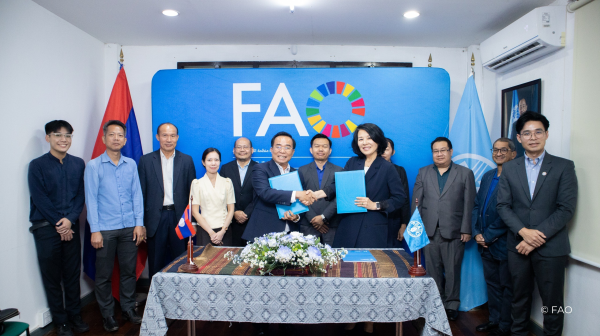KPL
The Government of the Lao PDR, through the Department of Irrigation (DOI) under the Ministry of Agriculture and Environment, and the Food and Agriculture Organization of the United Nations (FAO) have signed a landmark consultancy service agreement to upgrade the Laos Climate Services for Agriculture (LaCSA) platform.

The agreement, formalized under the Asian Development Bank (ADB)-financed Sustainable Rural Infrastructure and Watershed Management Sector Project (SRIWMSP), aims to strengthen the resilience of Lao farmers amid rising climate change impacts, recurrent flooding, and increasingly unpredictable weather patterns.
Agriculture remains the backbone of the Lao economy, yet the sector is highly vulnerable to climate variability. The initiative focuses on technically upgrading the existing LaCSA system to deliver more detailed, actionable information to rural communities. Key improvements include integrating ten additional crop types into forecasting models, adding nutritional data to support food security, and deploying a proactive flood early warning system developed in collaboration with the University of California, Irvine.
“LaCSA is a comprehensive, multi-faceted initiative that functions as a complete system for providing climate services to farmers and institutions in the Lao PDR,” said Kyung-Mee Kim, FAO Representative to the Lao PDR. “By delivering timely climate information, crop-specific advisories, and early warning systems, we are empowering farmers to make informed decisions that safeguard their livelihoods and promote sustainable farming practices. This initiative aligns with national priorities and reflects the strong collaboration between the Government, FAO, and our development partners.”
Mr. Khamphachanh Vongsana, Director General of the Department of Irrigation, highlighted the expected impact on local communities. “Our primary goal with the Rural Infrastructure Development Project is to protect the livelihoods of our farmers,” he said. “By expanding early warning systems to cover more districts and a wider range of crops, we are ensuring that communities in the target provinces receive timely information to protect their harvests from flooding and make decisions that enhance food security and nutrition.”
To ensure effective use of the upgraded system, the project includes a comprehensive training program for Provincial and District Agriculture and Environment Offices across 10 districts in four target provinces. This capacity building will help ensure that the LaCSA platform’s technical advancements translate into improved agricultural planning and disaster risk reduction in the field.
This initiative forms part of the ADB-supported Sustainable Rural Infrastructure and Watershed Management Sector Project (SRIWMSP), which aims to enhance agricultural profitability and resilience in the Lao PDR. Through modernizing irrigation infrastructure and strengthening land use management, the project supports the Government’s objectives for sustainable watershed management.
KPL